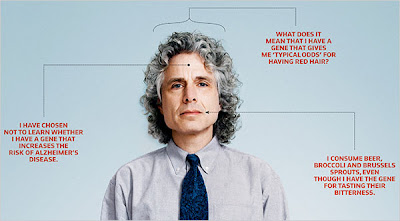
But Pinker does not want to embrace "determinism." He writes: "Nor should the scare word “determinism” get in the way of understanding our genetic roots. For some conditions, like Huntington’s disease, genetic determinism is simply correct: everyone with the defective gene who lives long enough will develop the condition. But for most other traits, any influence of the genes will be probabilistic. Having a version of a gene may change the odds, making you more or less likely to have a trait, all things being equal, but as we shall see, the actual outcome depends on a tangle of other circumstances as well."
I made a recent post where certain sociologists claimed the nature-nurture debate is alive and well. Pinker seems to think otherwise. Nature has won. "The most prominent finding of behavioral genetics has been summarized by the psychologist Eric Turkheimer: “The nature-nurture debate is over. . . . All human behavioral traits are heritable.” By this he meant that a substantial fraction of the variation among individuals within a culture can be linked to variation in their genes."
But Turkheimer is "quick to add that many of the differences among people cannot be attributed to their genes. First among these are the effects of culture, which cannot be measured by these studies because all the participants come from the same culture, typically middle-class European or American. The importance of culture is obvious from the study of history and anthropology." OK..., maybe. Doesn't this admission show the nature-nurture debate is not over?
Pinker writes: "Behavioral genetics has repeatedly found that the “shared environment” — everything that siblings growing up in the same home have in common, including their parents, their neighborhood, their home, their peer group and their school — has less of an influence on the way they turn out than their genes. In many studies, the shared environment has no measurable influence on the adult at all." So, nature wins. or, nature is far more powerful than nurture. "Perhaps our genes affect our environments, which in turn affect ourselves."
Are there nongenetic causes of individuality? If there are any, Pinker says, no one knows what they are. And, "the two traditional shapers of a person, nature and nurture, must be augmented by a third one, brute chance... Our genes are a big part of what we are. But even knowing the totality of genetic predictors, there will be many things about ourselves that no genome scan — and for that matter, no demographic checklist — will ever reveal."
The substance of Pinker's essay is on "Personal Genomics." If, e.g., you could know that you have the gene for Huntington's Disease (if you have it, and live long enough, you will get the disease), would you want to know?
For me, I'm fascinated by the philosophical issues implied by the coming genomic revolution. What about free will? We seem to be able to "choose" against our genotypes. Pinker gives me a morsel when he writes: "The self is a byzantine bureaucracy, and no gene can push the buttons of behavior by itself. You can attribute the ability to defy our genotypes to free will, whatever that means, but you can also attribute it to the fact that in a hundred-trillion-synapse human brain, any single influence can be outweighed by the product of all of the others."
I can't help but agree with these closing words of Pinker: "Our genomes truly are a fundamental part of us. They are what make us human, including the distinctively human ability to learn and create culture. They account for at least half of what makes us different from our neighbors. And though we can change both inherited and acquired traits, changing the inherited ones is usually harder. It is a question of the most perspicuous level of analysis at which to understand a complex phenomenon."
I think Christian philosophers and theologians should be able to agree with this. The ongoing work of genomist Francis Collins, who believes genomic analysis is "the language of God," encourages me. The result is that I'm now diving into neuro-studies and genomic studies as deeply as I can.